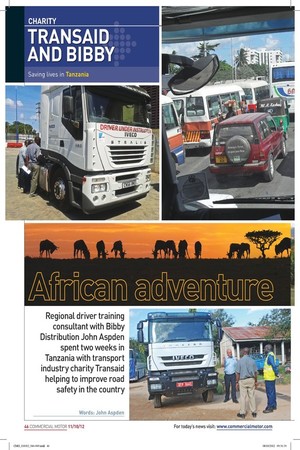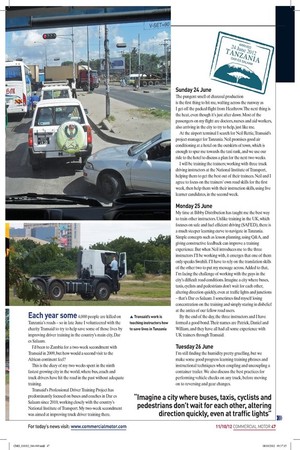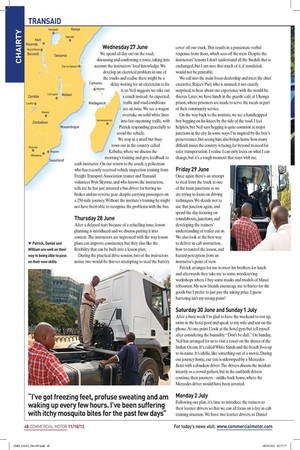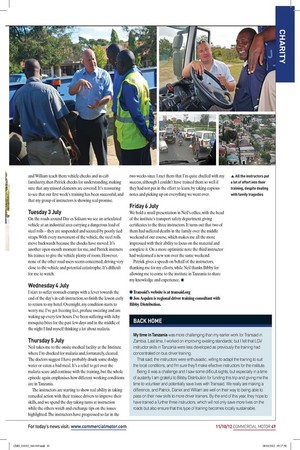CHARITY
Page 38

Page 39

Page 40

Page 41

If you've noticed an error in this article please click here to report it so we can fix it.
TRANSAID AND BIBBY
Regional driver training consultant with Bibby Distribution John Aspden spent two weeks in Tanzania with transport industry charity Transaid helping to improve road safety in the country
Words: John Aspden Each year some 4,000 people are killed on Tanzania’s roads – so in late June I volunteered with the charity Transaid to try to help save some of those lives by improving driver training in the country’s main city, Dar es Salaam.
I’d been to Zambia for a two-week secondment with Transaid in 2009, but how would a second visit to the African continent feel?
This is the diary of my two weeks spent in the ninth fastest growing city in the world, where bus, coach and truck drivers have hit the road in the past without adequate training.
Transaid’s Professional Driver Training Project has predominantly focused on buses and coaches in Dar es Salaam since 2010, working closely with the country’s National Institute of Transport. My two-week secondment was aimed at improving truck driver training there.
Sunday 24 June
The pungent smell of charcoal production is the first thing to hit me, wafting across the runway as I get off the packed flight from Heathrow. The next thing is the heat, even though it’s just after dawn. Most of the passengers on my flight are doctors, nurses and aid workers, also arriving in the city to try to help, just like me.
At the airport terminal I search for Neil Rettie, Transaid’s project manager for Tanzania. Neil promises good air conditioning at a hotel on the outskirts of town, which is enough to spur me towards the taxi rank, and we use our ride to the hotel to discuss a plan for the next two weeks.
I will be training the trainers; working with three truck driving instructors at the National Institute of Transport, helping them to get the best out of their trainees. Neil and I agree to focus on the trainers’ own road skills for the first week, then help them with their instruction skills, using live learner candidates, in the second week.
Monday 25 June
My time at Bibby Distribution has taught me the best way to train other instructors. Unlike training in the UK, which focuses on safe and fuel efficient driving (SAFED), there is a much steeper learning curve to navigate in Tanzania. Simple concepts such as lesson planning, using Q&A, and giving constructive feedback can improve a training experience. But when Neil introduces me to the three instructors I’ll be working with, it emerges that one of them only speaks Swahili. I’ll have to rely on the translation skills of the other two to put my message across. Added to that, I’m facing the challenge of working with the guys in the city’s difficult road conditions. Imagine a city where buses, taxis, cyclists and pedestrians don’t wait for each other, altering direction quickly, even at traffic lights and junctions – that’s Dar es Salaam. I sometimes find myself losing concentration on the training and simply staring in disbelief at the antics of our fellow road users.
Transaid’s work is By the end of the day, the three instructors and I have teaching instructors how formed a good bond. Their names are Patrick, Daniel and to save lives in Tanzania William, and they have all had all some experience with UK trainers through Transaid.
Tuesday 26 June
I’m still finding the humidity pretty gruelling, but we make some good progress learning training phrases and instructional techniques when coupling and uncoupling a container trailer. We also discuss the best practices for performing vehicle checks on any truck, before moving on to reversing and gear changes.
Wednesday 27 June
We spend all day out on the road, discussing and confirming a route, taking into account the instructors’ local knowledge. We develop an electrical problem in one of the trucks and realise there might be a delay waiting for an electrician to fix it, so Neil suggests we take out a coach instead. As expected, traffic and road conditions are an issue. We see a wagon overtake on solid white lines into fast oncoming traffic, with Patrick responding gracefully to avoid the vehicle.
We stop in a small but busy town out in the country called Kabuha, where we discuss the morning’s training and give feedback to each instructor. On our return to the coach, a policeman who has recently received vehicle inspection training from Freight Transport Association trainer and Transaid volunteer Wyn Skyrme, and who knows the instructors, tells me he has just arrested a bus driver for having no brakes and no reverse gear, despite carrying passengers on a 250-mile journey. Without the institute’s training he might not have been able to recognise the problems with the bus.
Thursday 28 June
After a delayed start because of a refuelling issue, lesson planning is introduced and we discuss putting it into context. The instructors are impressed with the way lesson plans can improve consistency, but they also like the flexibility that can be built into a lesson plan.
During the practical drive session, two of the instructors notice two would-be thieves attempting to steal the battery cover off our truck. This results in a passionate verbal response from them, which sees off the men. Despite the instructors’ lessons I don’t understand all the Swahili that is exchanged, but I am sure that much of it, if translated, would not be printable.
We call into the main Iveco dealership and meet the chief executive, Rajeev Puri, who is amused, if not exactly surprised, to hear about our experience with the would-be thieves. Later, we have lunch in the guards’ café at Ukonga prison, where prisoners are made to serve the meals as part of their community service.
On the way back to the institute, we see a handicapped boy begging on his knees by the side of the road. I feel helpless, but Neil says begging is quite common at major junctions in the city. In some ways I’m inspired by the boy’s perseverance, but seeing him also brings home how many difficult issues the country is facing, far beyond its need for safer transportation. I realise I can only focus on what I can change, but it’s a tough moment that stays with me.
Friday 29 June
Once again there’s an attempt to steal from the truck at one of the main junctions as we are trying to focus on driving techniques. We decide not to use that junction again, and spend the day focusing on roundabouts, junctions, and developing the trainers’ understanding of trailer cut-in. We also look at the best way to deliver in-cab instruction, how to control the lesson, and hazard perception from an instructor’s point of view.
Patrick arranges for me to meet his brothers for lunch and afterwards they take me to some woodcarving workshops where I buy some masks and models of Masai tribesmen. My new friends encourage me to barter for the goods but I prefer to just pay the asking price. I guess bartering isn’t my strong point!
Saturday 30 June and Sunday 1 July
After a busy week I’m glad to have the weekend to rest up, swim in the hotel pool and speak to my wife and son on the phone. At one point I look at the hotel gym but tell myself after considering the humidity: “Don’t be daft.” On Sunday, Neil has arranged for us to visit a resort on the shores of the Indian Ocean. It’s called White Sands and the beach lives up to its name. It’s idyllic, like something out of a movie. During our journey home, our taxi is sideswiped by a MercedesBenz with a drunken driver. The drivers discuss the incident intently as a crowd gathers, but in the end both drivers continue their journeys – unlike back home, where the Mercedes driver would have been arrested.
Monday 2 July
Following our plan, it’s time to introduce the trainers to their learner drivers so that we can all focus on a live in-cab training situation. We have two learner drivers, so Daniel and William teach them vehicle checks and in-cab familiarity, then Patrick checks for understanding, making sure that any missed elements are covered. It’s reassuring to see that our first week’s training has been successful, and that my group of instructors is showing real promise.
Tuesday 3 July
On the roads around Dar es Salaam we see an articulated vehicle at an industrial area carrying a dangerous load of steel rolls – they are suspended and secured by poorly tied straps. With every movement of the vehicle, the steel rolls move backwards because the chocks have moved. It’s another open-mouth moment for me, and Patrick instructs his trainee to give the vehicle plenty of room. However, none of the other road users seems concerned, driving very close to the vehicle and potential catastrophe. It’s difficult for me to watch.
Wednesday 4 July
I start to suffer stomach cramps with a fever towards the end of the day’s in-cab instruction, so finish the lesson early to return to my hotel. Overnight, my condition starts to worry me. I’ve got freezing feet, profuse sweating and am waking up every few hours. I’ve been suffering with itchy mosquito bites for the past few days and in the middle of the night I find myself thinking a lot about malaria.
Thursday 5 July
Neil takes me to the onsite medical facility at the Institute where I’m checked for malaria and, fortunately, cleared. The doctors suggest I have probably drunk some dodgy water or eaten a bad meal. It’s a relief to get over the malaria scare and continue with the training, but the whole episode again emphasises how different working conditions are in Tanzania.
The instructors are starting to show real ability in taking remedial action with their trainee drivers to improve their skills, and we spend the day taking turns at instruction while the others watch and exchange tips on the issues highlighted. The instructors have progressed so far in the two weeks since I met them that I’m quite chuffed with my success, although I couldn’t have trained them so well if they had not put in the effort to learn, by taking copious notes and picking up on everything we went over.
Friday 6 July
We hold a small presentation in Neil’s office, with the head of the institute’s transport safety department giving certificates to the three instructors. It turns out that two of them had suffered deaths in the family over the middle weekend of our course, which makes me all the more impressed with their ability to focus on the material and complete it. On a more optimistic note the third instructor had welcomed a new son over the same weekend.
Patrick gives a speech on behalf of the instructors, thanking me for my efforts, while Neil thanks Bibby for allowing me to come to the institute in Tanzania to share my knowledge and experience. ■
• Transaid’s website is at transaid.org • Jon Aspden is regional driver training consultant with Bibby Distribution.











































